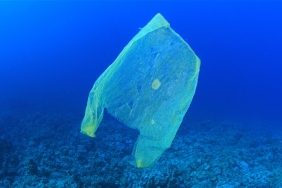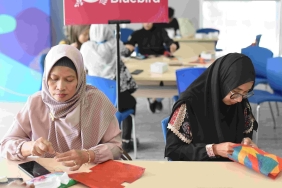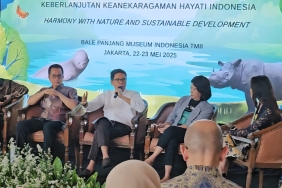TOGETHER WITH THE COMMUNITY, PERPETUATE THE COLLABORATIVE ACTION OF BEACH CLEANUP AND WAKATOBI COASTAL WASTE DATA COLLECTION
By: Martina Rahmadani (Responsible Marine Tourism Officer, WWF-Indonesia)
Fatu Sahuu Beach in Kabita Village, Kapota Island, Wakatobi that day (28/07/2018) was filled with 50 people who cleaned 1.5 km long beach from trash. Coinciding with World Nature Conservation Day, Komunitas Melihat Alam (Kamelia) invited WWF-Indonesia, the Wakatobi National Park Center, Isakapala (Creative Young Nature Lovers), the Wakatobi Marine and Fisheries Service (DKP), and all Kapota residents to clean the beach. This is certainly in line with the government's target to reduce 70% of ocean plastic pollution by 2025.
"The joint beach cleaning activity initiated by Kamelia is a good step, considering that Fatu Sahuu beach is one of the tourism potentials of Kabita Village, which we must protect together," said the Head of Kabita Village in his opening remarks.
The iconic white sandy beach with a rock standing on its edge (Fatu Sahuu, meaning one rock) looks dirty in certain seasons with piles of plastic waste that rise on the coast. In other seasons, it is a clean beach.
"The plastic waste that is carried to this beach could have been in the sea for years and is only carried around the coast in Wakatobi," explained Hardin, Coordinator of Kamelia, a cross-agency nature care group established in 2016.
"Fatu Sahuu Beach is one of the beaches affected by the behavior of our people who easily throw garbage in the sea. Let's change it together," he continued.
The process of improving environmental awareness is also marked by the Kabita Rural Forestry Extension Center (SPKP) which includes beach cleanup as a routine monthly agenda. "As a form of our responsibility to the environment," said Edyar, Kabita's SPKP facilitator.
While cleaning the beach, recording waste
The beach cleanup movement carried out today is not only an action to collect plastic waste on the beach but also data collection of plastic waste on the coast with a method developed by the Commonwealth Scientific and Industrial Research Organization (CSIRO) Global Plastic Pollution Project, Australia, using a random sampling design.
The CSIRO method aims to measure the leakage of plastic waste found on the coast using a transect system. Transect means a line or path to find out and observe the distribution or presence of waste along an area.
Within 2 hours and 1.5 km of beach length, this activity can clean up plastic waste weighing 700 kg with dry plastic waste types. The dominant plastic waste found was in the form of plastic drinking bottles and drinking cups. From the observation on the transect, it was found that of the total 217 waste, 33% were hard plastic, 47% soft plastic, 7% sterefoam, and 5% rubber. The rest were glass, paper, and net. The average concentration of waste found was 2.7 waste/m2.
It is hoped that this initial data collection can also be carried out by the village and the community at large so that we can have data on marine debris. This data can be taken into consideration in determining future policies related to waste management, both carried out by villages and local and national governments.
Handling marine debris, starting from ourselves
Currently, unfortunately, the waste collected is not yet known how to properly manage it, this is because there is no waste processing location, especially plastic waste in Kapota. Surely this is a concern for policy makers, when the community begins to move to clean up the garbage around the coast, what can the government do for the management stage. Thus, the reduction of existing plastic waste or plastic waste that lands on the coast can be handled properly.
Waste management is important because plastic waste is exposed to sunlight, continuously exposed to waves and tides, causing plastic to degrade into small particles or microplastics that are ingested by marine fauna, contaminating the seafood products we consume. This condition is a warning to the Indonesian government that declining water quality and damage to marine ecosystems are threats that must be resolved immediately.
It takes the efforts of various parties to reduce plastic waste in the ocean. Not only beach cleanup actions, but also actions from ourselves by reducing the consumption of single-use plastics and being wise in using plastic packaging. So that the ideals of Indonesia free from plastic waste can be realized.





